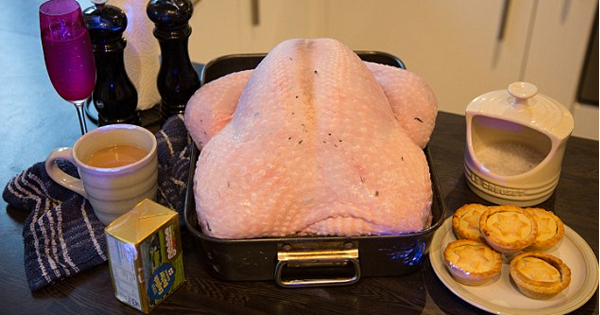If you’re making turkey this year, it’s looking more and more likely that you’ll get food poisoning.
Dr. Kevin Hargin, head of foodborne disease control at the Food Standards Agency, said, “People buy a lot more food than usual. They’re catering for bigger numbers, their fridges are over-stuffed and not working efficiently, and food gets left out for longer than it would otherwise.
The biggest culprit, of course, is turkey.
If it’s not cooked properly (which it often isn’t), bacteria such as salmonella and campylobacter can survive in the turkey.
However, that’s not even where most of the danger comes from. You’re much more likely to get contaminated from handling all the raw meat. This is the easiest way to get campylobacter. In fact, four out of five cases of campylobacter come from handling raw poultry.
The bacteria lives inside the bird, and spreads when it’s slaughtered.
Other sources of campylobacter include red meat and untreated water, but you’re definitely most likely to get it from your turkey.
It takes only a few of them to make you sick, and they spread fast.
Campylobacter is particularly nasty. It can occur any time from two to ten days after infection, and it causes vomiting and diarrhea.
Other nasty bacteria you can get from turkey are salmonella, and clostridium perfringens. The latter is found most often in leftovers. This is because eating these bacteria isn’t harmful right after it’s been cooked, but once it’s cooled off, the spores can continue growing.
So if you’re looking to avoid food poisoning, here are some tips:
- Don’t skip out on defrosting your turkey. A turkey could take up to two days to defrost in the refrigerator or around four hours if it’s outside the refrigerator in a cool place. If you don’t fully defrost it, it won’t cook properly.
- Wash your hands frequently while cooking the turkey. If you don’t, everything you touch that isn’t the turkey can get bacteria all over it.
- You don’t need to wash the turkey. Not only will properly cooking the turkey kill off all the bugs, but all the water splashing around your sink and counter will cover your kitchen surfaces in bacteria. This includes the tap, the draining board, and any dishes you may have drying around the sink.
When preparing your turkey, try to keep your cooking to as small a space as possible, and clean every single surface you touch when you’re done. It just may help you and your guests avoid food poisoning.





